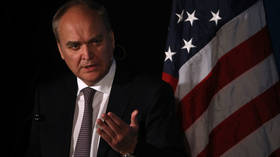
US military aid to Kiev has strained its own stockpiles as the Congress-approved money pot ran dry

FILE PHOTO: A Ukrainian soldier is seen near a US-made Bradley fighting vehicle, December 4, 2023 © Marek M. Berezowski / Anadolu via Getty Images
The US Defense Department has asked the Congress to allocate at least $6.5 billion to replenish its stocks, which have been depleted after two years of constant weapon deliveries to Ukraine, according to a document seen by Bloomberg.
The Pentagon emphasized the urgency and listed priority spendings in its replenishment proposals sent to Congress last month, the outlet reported on Thursday.
The shopping list reportedly includes a wide range of weapons, ammunition and critical components for the production of 155mm shells, HARM anti-radar missiles, Patriot interceptors, GMLRS rockets and anti-tank TOWs.
While the Pentagon estimated its immediate replenishment needs at $6.5 billion, multiple US media reports suggested earlier this week that the total deficit could be at least $10 billion. Unless the shortfall is compensated, the “ongoing hole” will put a strain on the US military, one source told Politico.
READ MORE: Ukraine’s ammo shortage hurting US strategy – White House
Washington had provided more than $75 billion in cash and equipment for Ukraine’s war effort by the end of last year, by far surpassing other Western donors, but the deliveries stopped after the Congress-approved money pot ran dry.

The White House has requested over $60 billion in supplemental Ukraine assistance, but the Republican-controlled House has stonewalled repeated calls by US President Joe Biden to release the money. Biden has blamed US lawmakers for Kiev’s recent battlefield losses, including last month’s fall of Avdeevka to Russian forces.
Despite running out of money, the White House has found enough “unanticipated savings” at the Pentagon to announce a new aid package valued at up to $300 million this week. The Pentagon still has the authority to send some $4 billion worth of aid to Ukraine, but Defense Secretary Lloyd Austin has so far been reluctant to tap into that fund with no assurances the money will be replaced by US lawmakers.




